 web3.0
web3.0
 DePIN leads the way, AI helps: a glance at the DePAI map of decentralized physics and artificial intelligence
DePIN leads the way, AI helps: a glance at the DePAI map of decentralized physics and artificial intelligence
DePIN leads the way, AI helps: a glance at the DePAI map of decentralized physics and artificial intelligence
Decentralized physical artificial intelligence (DePAI) is leading a new direction in the development of artificial intelligence and providing innovative solutions for the control of robots and related infrastructure. This article will conduct in-depth discussions on DePAI and its applications in the fields of data acquisition, remote operation and spatial intelligence, and analyze its development prospects.
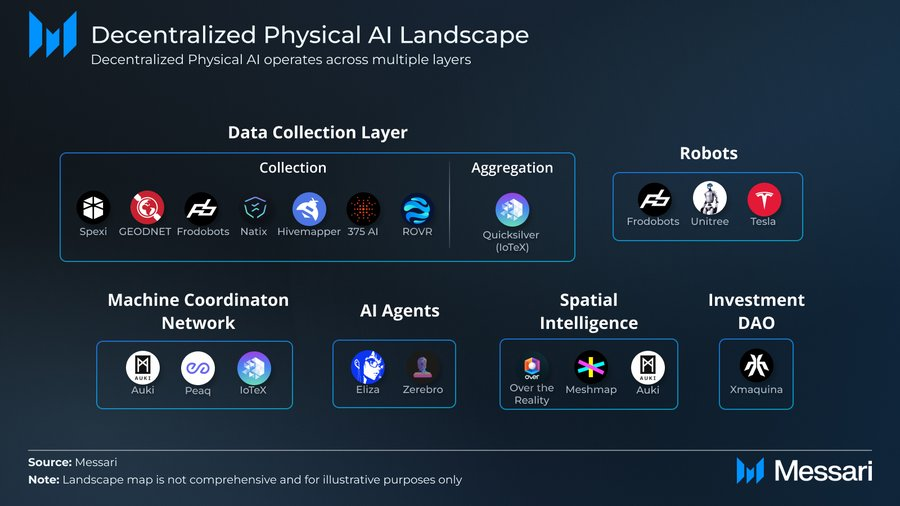
As Nvidia CEO Huang Renxun said, the "ChatGPT moment" in the field of general robots is coming soon. The development process of artificial intelligence, from hardware to software, is now moving towards the physical world. In the era of future robot popularity, DePAI provides important opportunities for building a physical artificial intelligence ecosystem based on Web3, especially when centralized forces have not yet fully dominated the market.
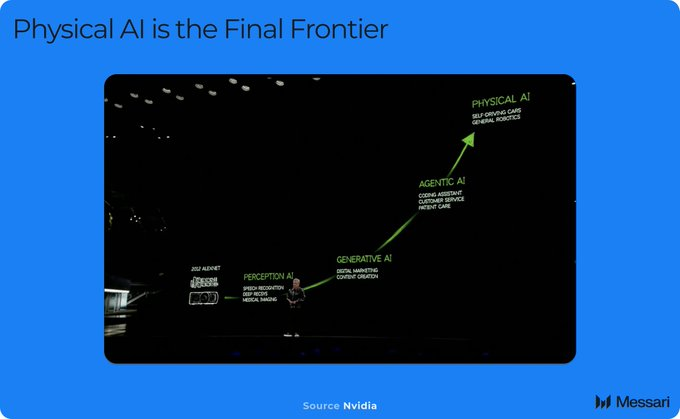
The widespread application of autonomous physical artificial intelligence agents will bring about the ownership of robots, smart cars, drones and other equipment. DePAI provides new ideas for solving this problem.
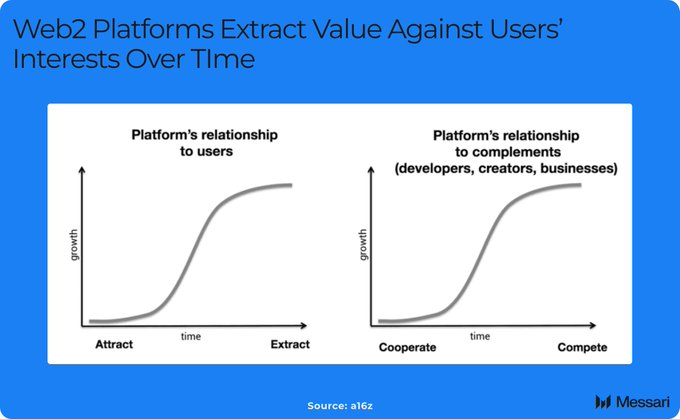
Core areas:
- Data collection: In the construction of DePAI infrastructure, data collection is the most active. High-quality real-world data is the key to the development of physical artificial intelligence, and DePIN can effectively promote the deployment of data acquisition equipment and robots. While simulated environments such as Nvidia's Omniverse and Cosmos provide synthetic data, remote operation and real video data are still indispensable.
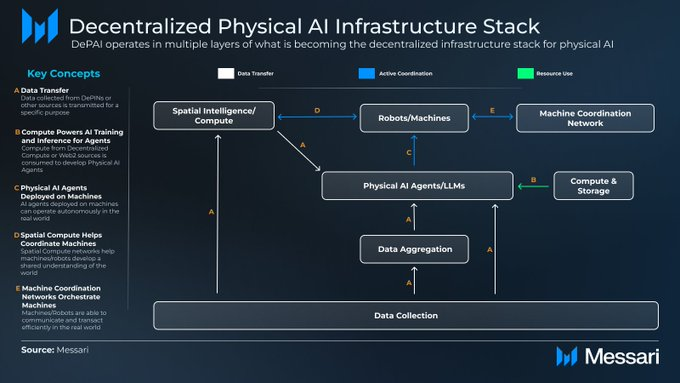
- Remote operation: Frodobots uses DePIN to deploy economical distribution robots, which not only collects human decision-making data, but also solves the problem of insufficient funds and forms a virtuous cycle. This has a significant advantage in reducing the cost of robot companies.
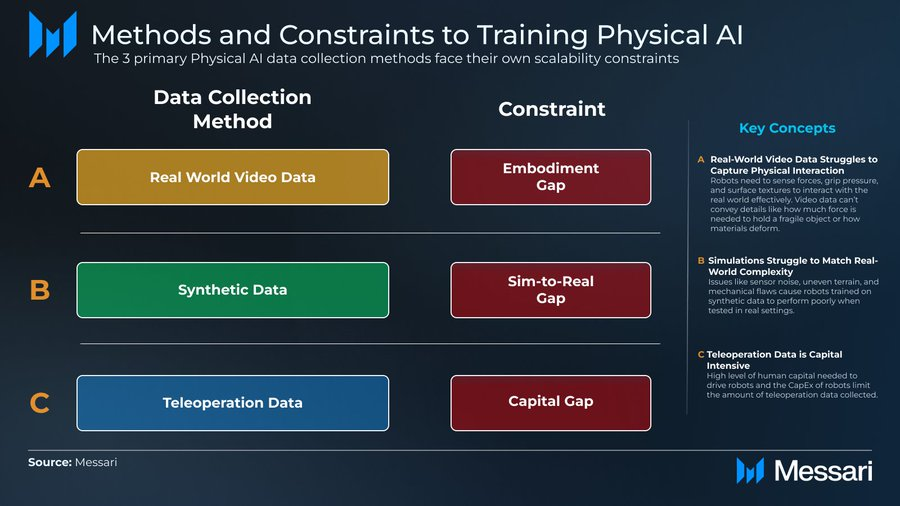
- Video Data Application: Video database provided by platforms such as Hivemapper and NATIX Network provides an important data source for DePAI to train physical artificial intelligence systems and build spatial cognition. IoTeX's Quicksilver platform can aggregate data across DePIN and ensure data verification and privacy protection.

- Space Intelligence and Computing: Auki Network's Posemesh technology realizes real-time spatial perception under privacy protection. SAM uses Frodobots' robot network to infer geographical locations, and will use frameworks such as Quicksilver to better access DePIN data in the future.
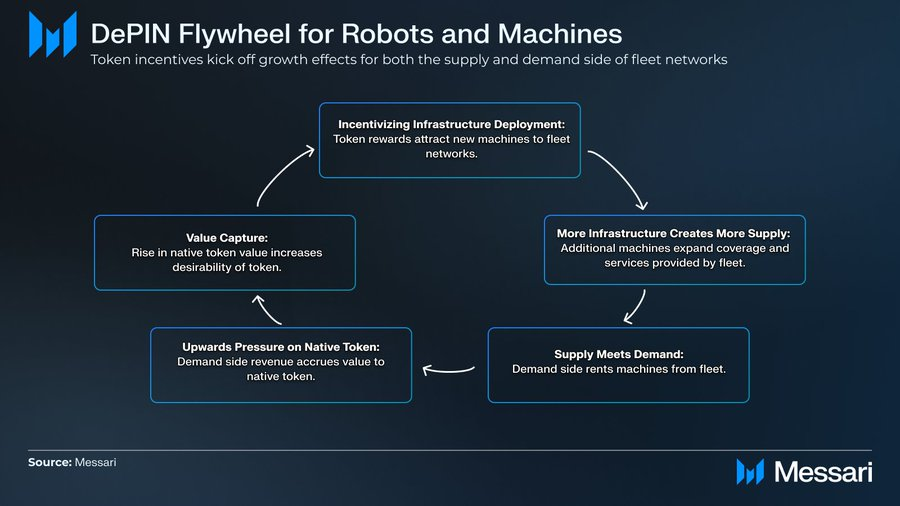
Investment Opportunities: For investors, investing in DePAI-related DAOs, such as XMAQUINA, may be an ideal entry point, which provides a diversified portfolio of physical artificial intelligence assets.

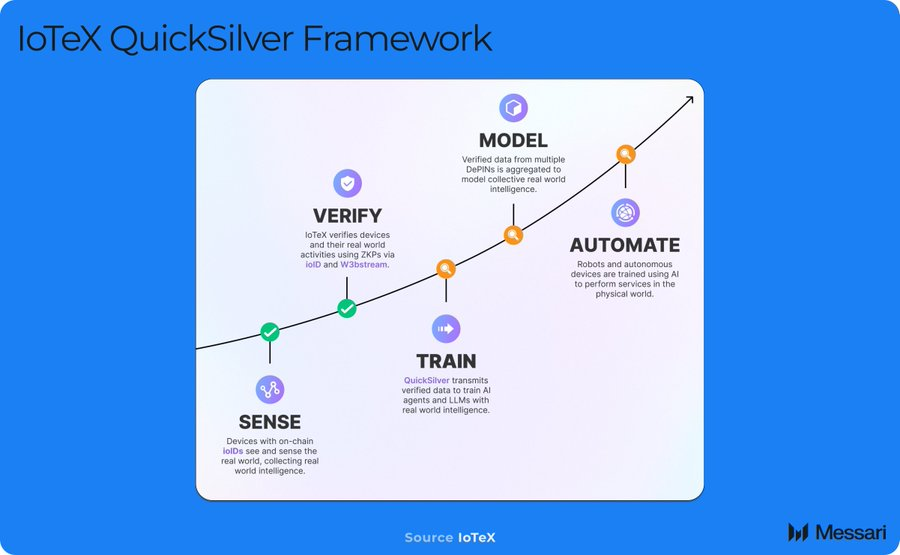
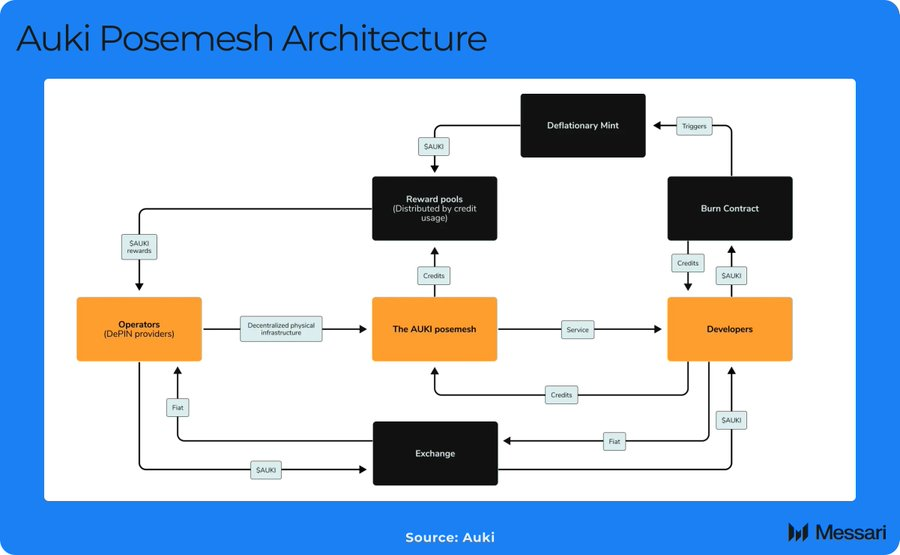

In short, the emergence of DePAI has provided new possibilities for the development of physical artificial intelligence, and its innovations in data, computing and applications are worthy of attention.
The above is the detailed content of DePIN leads the way, AI helps: a glance at the DePAI map of decentralized physics and artificial intelligence. For more information, please follow other related articles on the PHP Chinese website!

Hot AI Tools

Undresser.AI Undress
AI-powered app for creating realistic nude photos

AI Clothes Remover
Online AI tool for removing clothes from photos.

Undress AI Tool
Undress images for free

Clothoff.io
AI clothes remover

AI Hentai Generator
Generate AI Hentai for free.

Hot Article

Hot Tools

Notepad++7.3.1
Easy-to-use and free code editor

SublimeText3 Chinese version
Chinese version, very easy to use

Zend Studio 13.0.1
Powerful PHP integrated development environment

Dreamweaver CS6
Visual web development tools

SublimeText3 Mac version
God-level code editing software (SublimeText3)

Hot Topics
 1377
1377
 52
52
 Laravel's geospatial: Optimization of interactive maps and large amounts of data
Apr 08, 2025 pm 12:24 PM
Laravel's geospatial: Optimization of interactive maps and large amounts of data
Apr 08, 2025 pm 12:24 PM
Efficiently process 7 million records and create interactive maps with geospatial technology. This article explores how to efficiently process over 7 million records using Laravel and MySQL and convert them into interactive map visualizations. Initial challenge project requirements: Extract valuable insights using 7 million records in MySQL database. Many people first consider programming languages, but ignore the database itself: Can it meet the needs? Is data migration or structural adjustment required? Can MySQL withstand such a large data load? Preliminary analysis: Key filters and properties need to be identified. After analysis, it was found that only a few attributes were related to the solution. We verified the feasibility of the filter and set some restrictions to optimize the search. Map search based on city
 How to solve mysql cannot be started
Apr 08, 2025 pm 02:21 PM
How to solve mysql cannot be started
Apr 08, 2025 pm 02:21 PM
There are many reasons why MySQL startup fails, and it can be diagnosed by checking the error log. Common causes include port conflicts (check port occupancy and modify configuration), permission issues (check service running user permissions), configuration file errors (check parameter settings), data directory corruption (restore data or rebuild table space), InnoDB table space issues (check ibdata1 files), plug-in loading failure (check error log). When solving problems, you should analyze them based on the error log, find the root cause of the problem, and develop the habit of backing up data regularly to prevent and solve problems.
 How to use mysql after installation
Apr 08, 2025 am 11:48 AM
How to use mysql after installation
Apr 08, 2025 am 11:48 AM
The article introduces the operation of MySQL database. First, you need to install a MySQL client, such as MySQLWorkbench or command line client. 1. Use the mysql-uroot-p command to connect to the server and log in with the root account password; 2. Use CREATEDATABASE to create a database, and USE select a database; 3. Use CREATETABLE to create a table, define fields and data types; 4. Use INSERTINTO to insert data, query data, update data by UPDATE, and delete data by DELETE. Only by mastering these steps, learning to deal with common problems and optimizing database performance can you use MySQL efficiently.
 Can mysql return json
Apr 08, 2025 pm 03:09 PM
Can mysql return json
Apr 08, 2025 pm 03:09 PM
MySQL can return JSON data. The JSON_EXTRACT function extracts field values. For complex queries, you can consider using the WHERE clause to filter JSON data, but pay attention to its performance impact. MySQL's support for JSON is constantly increasing, and it is recommended to pay attention to the latest version and features.
 Understand ACID properties: The pillars of a reliable database
Apr 08, 2025 pm 06:33 PM
Understand ACID properties: The pillars of a reliable database
Apr 08, 2025 pm 06:33 PM
Detailed explanation of database ACID attributes ACID attributes are a set of rules to ensure the reliability and consistency of database transactions. They define how database systems handle transactions, and ensure data integrity and accuracy even in case of system crashes, power interruptions, or multiple users concurrent access. ACID Attribute Overview Atomicity: A transaction is regarded as an indivisible unit. Any part fails, the entire transaction is rolled back, and the database does not retain any changes. For example, if a bank transfer is deducted from one account but not increased to another, the entire operation is revoked. begintransaction; updateaccountssetbalance=balance-100wh
 Remote senior backend engineers (platforms) need circles
Apr 08, 2025 pm 12:27 PM
Remote senior backend engineers (platforms) need circles
Apr 08, 2025 pm 12:27 PM
Remote Senior Backend Engineer Job Vacant Company: Circle Location: Remote Office Job Type: Full-time Salary: $130,000-$140,000 Job Description Participate in the research and development of Circle mobile applications and public API-related features covering the entire software development lifecycle. Main responsibilities independently complete development work based on RubyonRails and collaborate with the React/Redux/Relay front-end team. Build core functionality and improvements for web applications and work closely with designers and leadership throughout the functional design process. Promote positive development processes and prioritize iteration speed. Requires more than 6 years of complex web application backend
 Laravel Eloquent ORM in Bangla partial model search)
Apr 08, 2025 pm 02:06 PM
Laravel Eloquent ORM in Bangla partial model search)
Apr 08, 2025 pm 02:06 PM
LaravelEloquent Model Retrieval: Easily obtaining database data EloquentORM provides a concise and easy-to-understand way to operate the database. This article will introduce various Eloquent model search techniques in detail to help you obtain data from the database efficiently. 1. Get all records. Use the all() method to get all records in the database table: useApp\Models\Post;$posts=Post::all(); This will return a collection. You can access data using foreach loop or other collection methods: foreach($postsas$post){echo$post->
 Master SQL LIMIT clause: Control the number of rows in a query
Apr 08, 2025 pm 07:00 PM
Master SQL LIMIT clause: Control the number of rows in a query
Apr 08, 2025 pm 07:00 PM
SQLLIMIT clause: Control the number of rows in query results. The LIMIT clause in SQL is used to limit the number of rows returned by the query. This is very useful when processing large data sets, paginated displays and test data, and can effectively improve query efficiency. Basic syntax of syntax: SELECTcolumn1,column2,...FROMtable_nameLIMITnumber_of_rows;number_of_rows: Specify the number of rows returned. Syntax with offset: SELECTcolumn1,column2,...FROMtable_nameLIMIToffset,number_of_rows;offset: Skip


